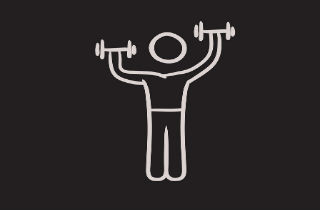By Louise A. Stanger Ed.d, LCSW, CIP, CDWF and Roger Porter
There’s no question recovery can be tough. At times, it can feel like attending group sessions is like climbing a Stairmaster. However, that Stairmaster may be that extra push for your body to feel great and experience the benefits of healthy living.
In fact, evidence suggests an added physical element is an essential treatment option that aids in recovery. And the added physical element can be all kinds of different exercises!
There are many new fitness options including hot yoga, bar method, Pilates and spinning on bikes to the soulful tracks of Lady Gaga. According to a study of patients being treated for substance abuse published in Mental Health & Physical Activity, “Exercise can lead to a sense of accomplishment; feeling stronger; improved health; and increased confidence in staying clean and sober.”
The two main benefits of exercise
The tangible benefits of exercise are twofold:
- Physical activity that involves a sustained increase in heart rate releases endorphins in the body.
- Physical activity curbs the negative withdrawal effects from giving up alcohol and illegal substances.
Although the high from exercise will not be as intense as from alcohol or other drugs, the body’s process of releasing endorphins and endocannabinoids creates a feeling of euphoria and regulates the body in a natural way. You’ll feel the benefits as your body adjusts and returns to a balanced function.
The effects of exercise on drug dependence
When someone is in recovery, their chemical dependency creates negative withdrawal effects such as troubled sleep and depression. Research shows that regular physical activity can mitigate these negative side effects. Exercise:
- regulates brain function
- builds the body’s defenses
- aids in releasing pent up emotions
In essence, physical activity such as yoga, running, strength training, walking, swimming, surfing, kickboxing, Pilates, cycling, many other team sports or a visit to the gym is a natural way of releasing physical and emotional angst in the body.
How can you start to get moving?
There are a number of ways a person in recovery may get involved in a fitness program that is right for you. The key is to start small and let it build into a regular practice in daily life.
Begin with something simple – a walk around your neighborhood or if you have access to equipment, a walk on a treadmill. For the more experienced, look into signing up at your local gym, community center or YMCA. Many gym memberships offer group classes that can help with motivation and building a sense of comradery while your heart is racing and sweat pouring. Also, having a workout partner – like having a sponsor – will give you accountability to stay on track.
With the rise in digital technology, new devices such as the Fitbit and Apple Watch offer exciting new ways to stay active and healthy. A Fitbit tracks your every step – and many users create personal as well as group challenges for maximizing their number of steps every day – it’s physically challenging and fun.
Here are some resources to help get you started.
- For helpful videos, articles and information about health and treatment options, check out Bradford Health Services at their website here.
- For a look at the four reasons to exercise during addiction recovery, visit the Bradford Health Services article here.
- For tips and advice on better health, visit one of the nation’s leading medical center’s blog at Harvard Health Publications here.
- For more health benefits of exercise, take a look at the Huffington Post’s blog here.
- Check out the National Institute of Health’s resources on health and fitness here.
- For more mind-blowing benefits of exercise, visit US News’ slideshow here.
- For a look at how exercise helps you stay sober, check out The Fix here.
Stay motivated – Concentrate on benefits!
Need some more motivation? Here are more ways exercise aids in recovery:
Better sleep. Addiction disrupts normal bodily function, including circadian rhythms. However, a regular fitness routine returns your body to its natural flow, which in turn restores your normal sleep cycles. You’ll get better rest which will help with every aspect of your body’s daily function.
Heals your mind and body. Research shows that regular exercise reduces the risk of heart disease, diabetes, other forms of cancer, and boosts immunity for a strong immune system.
Helps to de-stress and keep your emotions in check. Who hasn’t felt like life is a roller-coaster of emotions? A workout routine can be your time and place to weather difficult times and release the pressures of daily life. It’s a proactive way of coping with all the stuff life throws at you.
Exercise is “meditation in motion”. Research from the Mayo Clinic shows that by concentrating on physical activity, we can experience the psychological and emotional benefits of meditation and as well as develop a stronger ability to focus our thoughts.
Builds confidence. Exercise in all forms will build your physical and mental competencies. Over time, these strengths will feed your confidence and help you overcome your struggles.









Related Posts